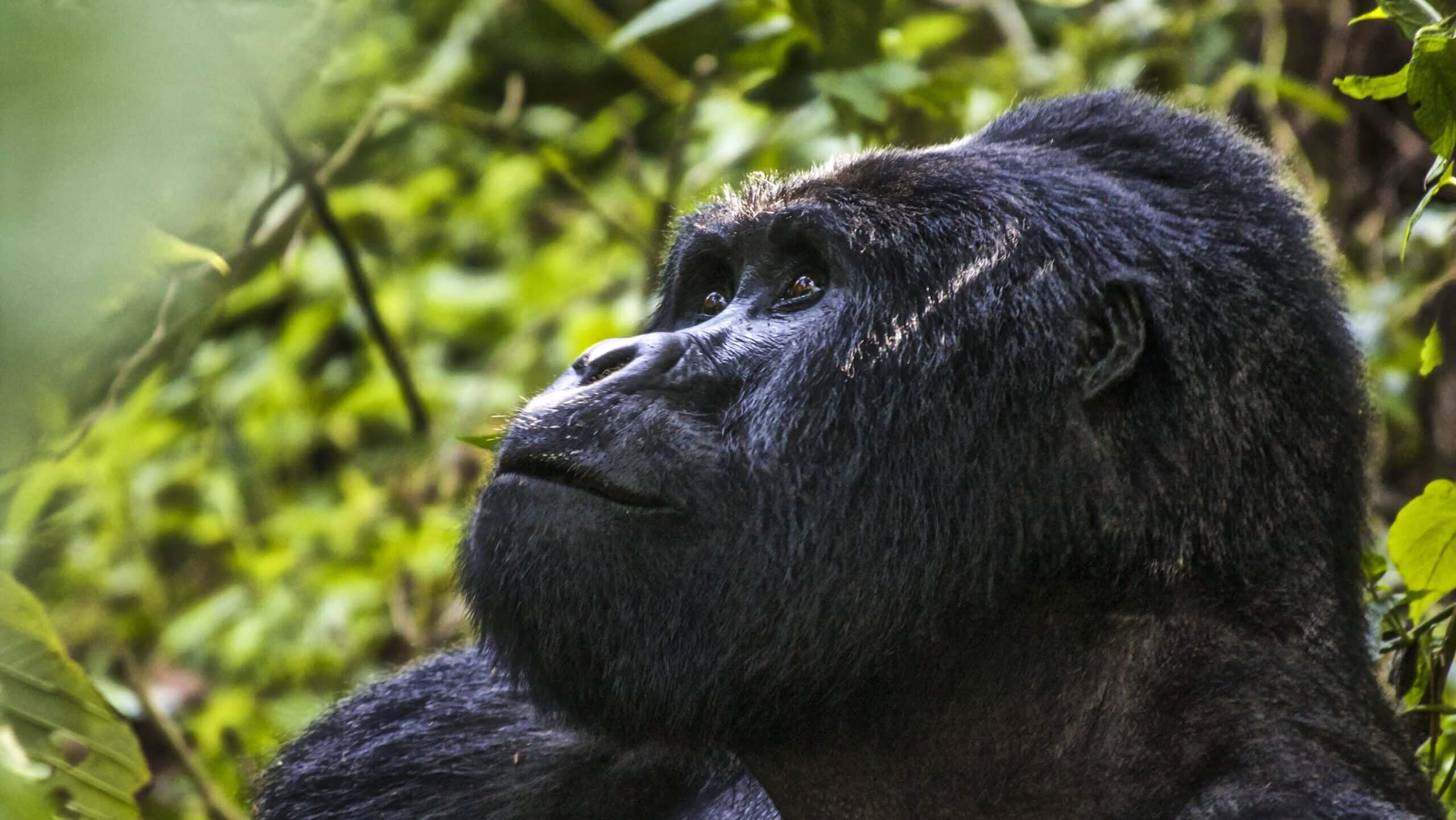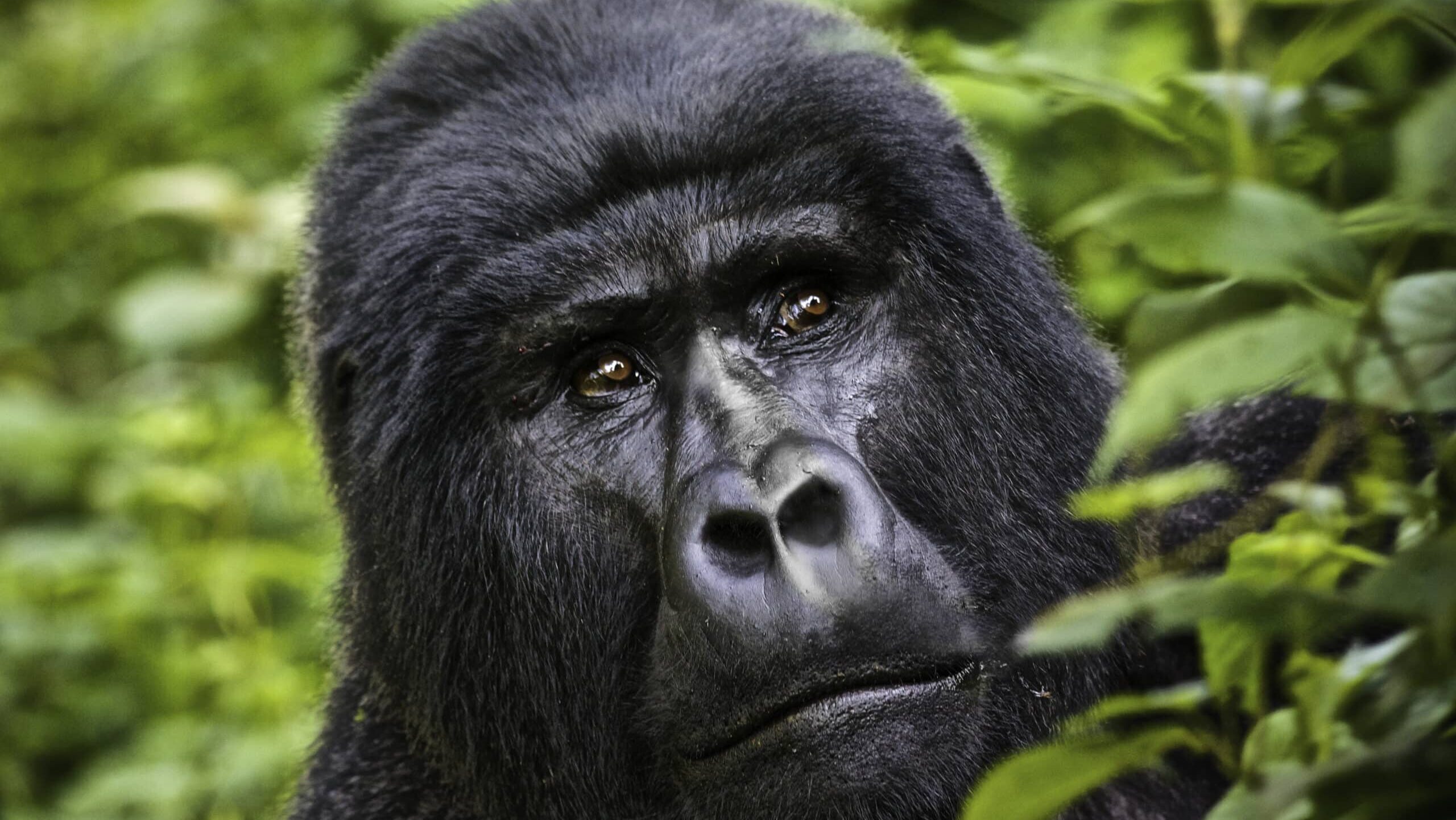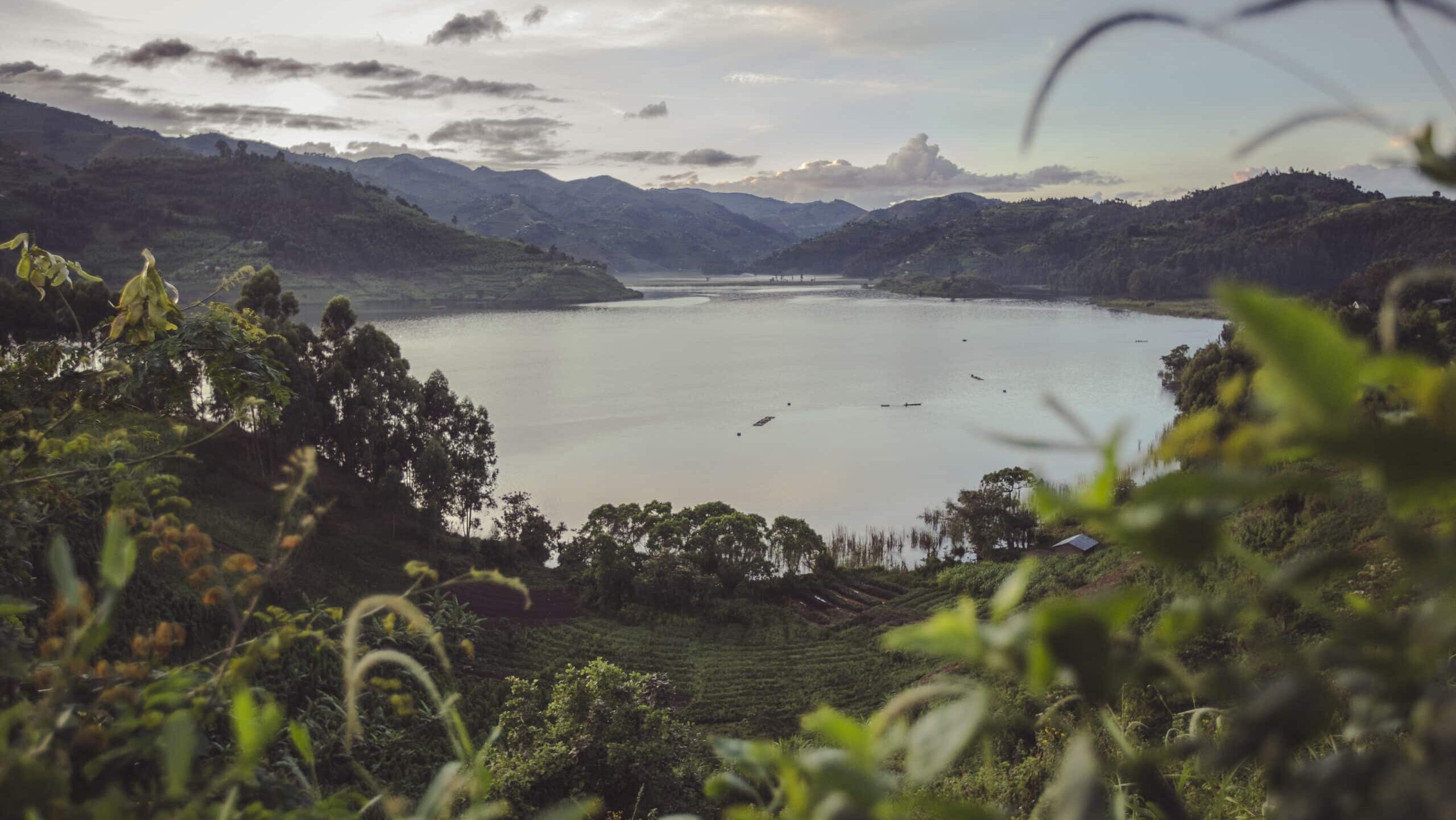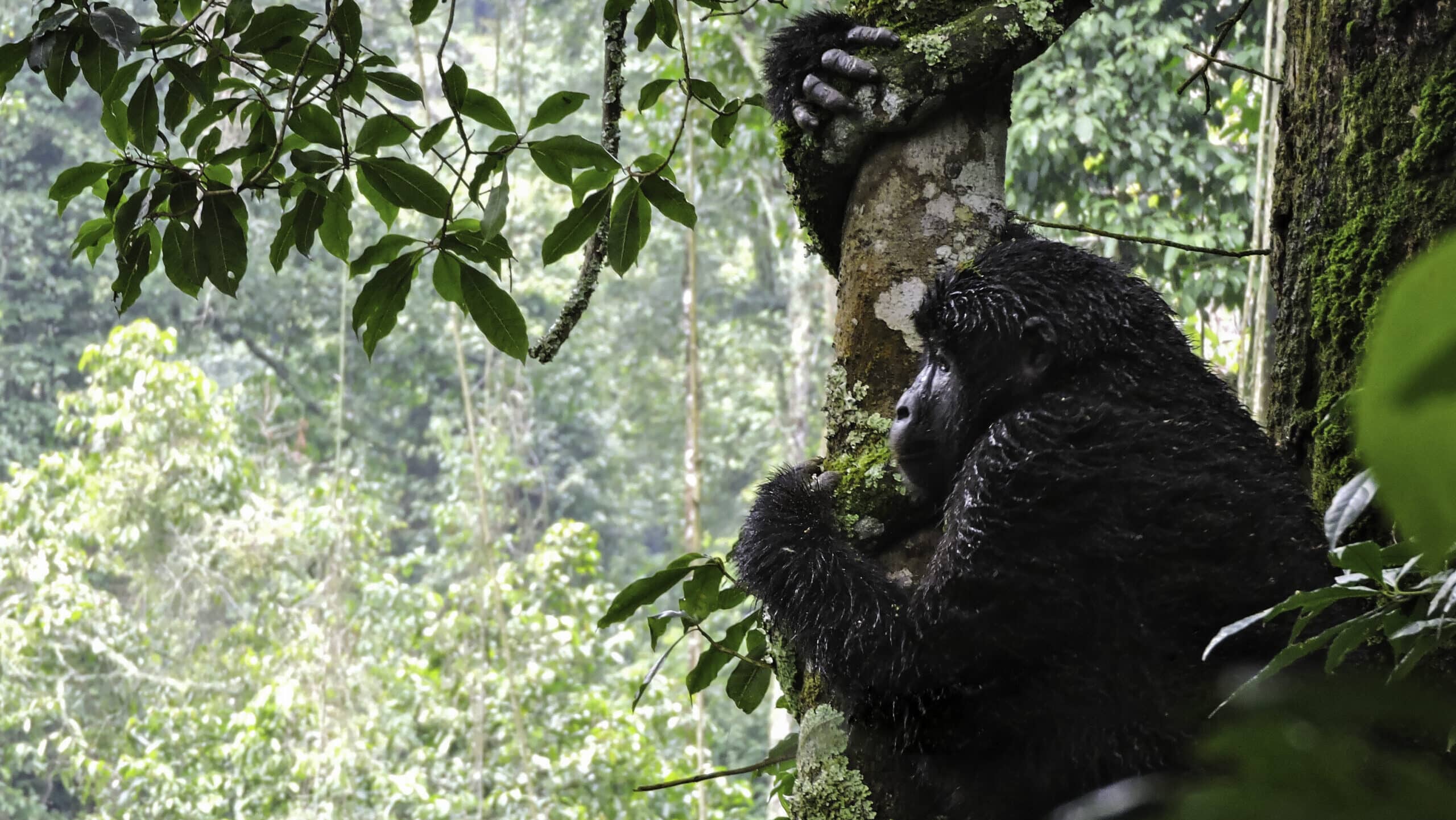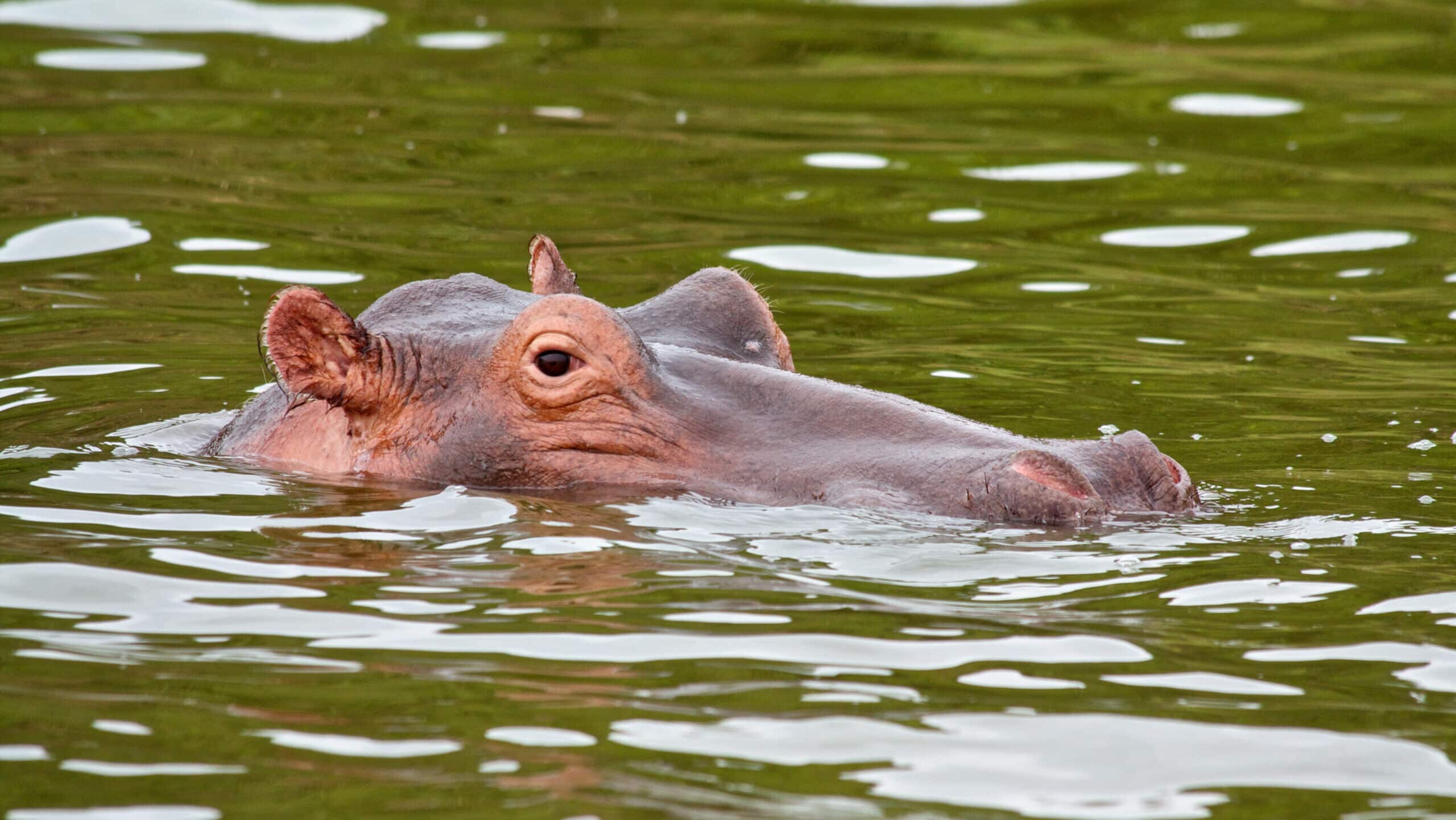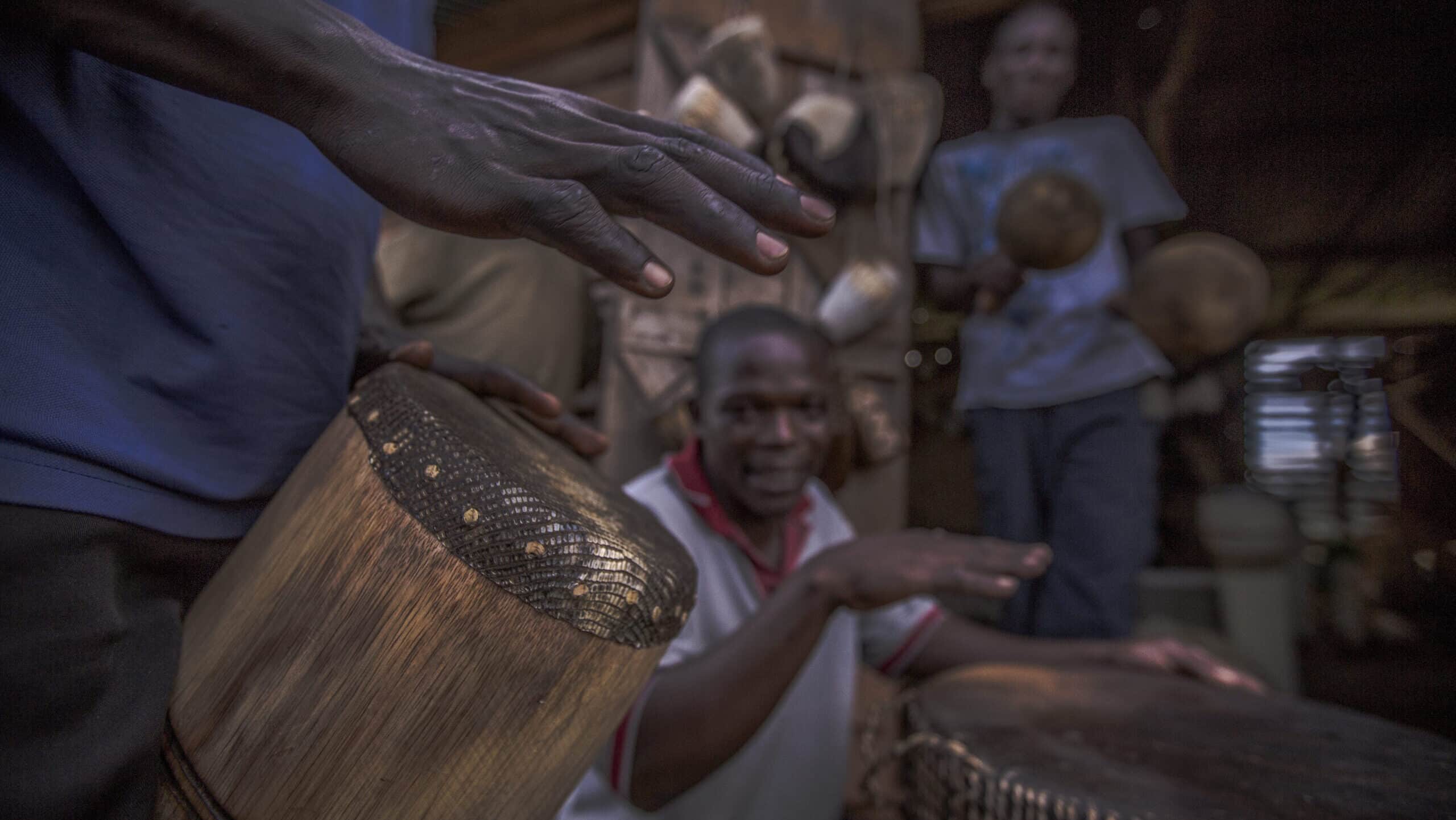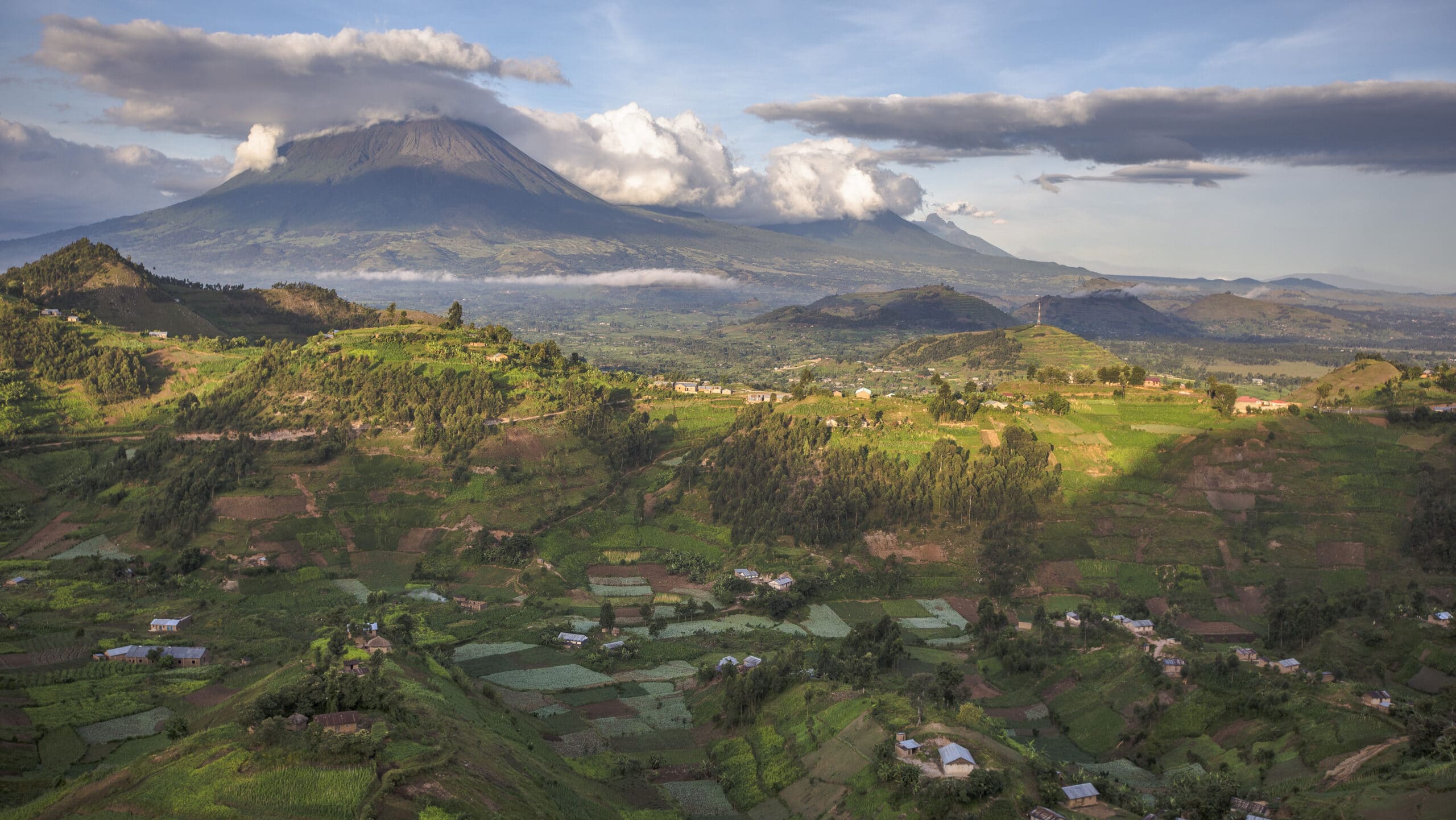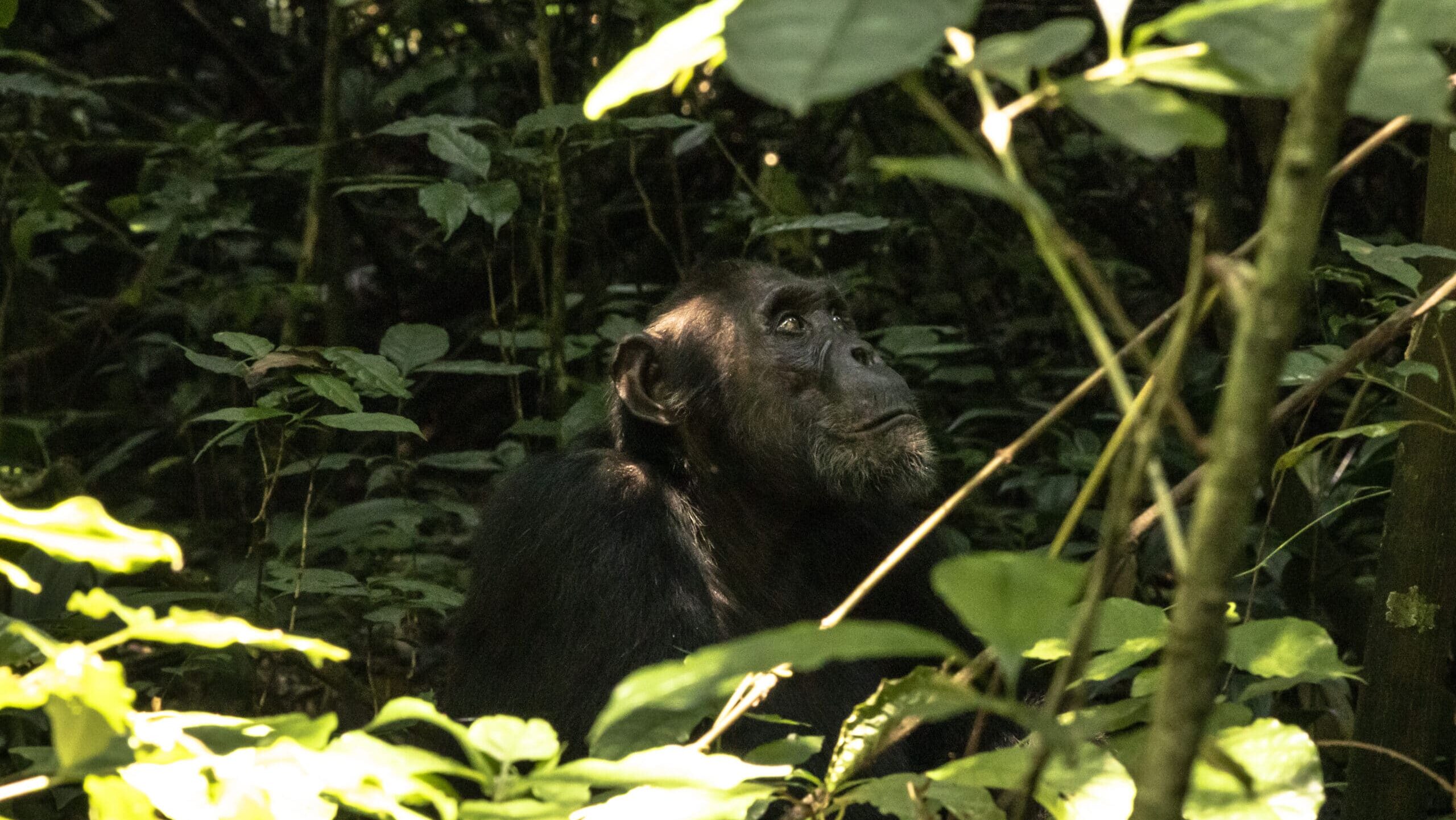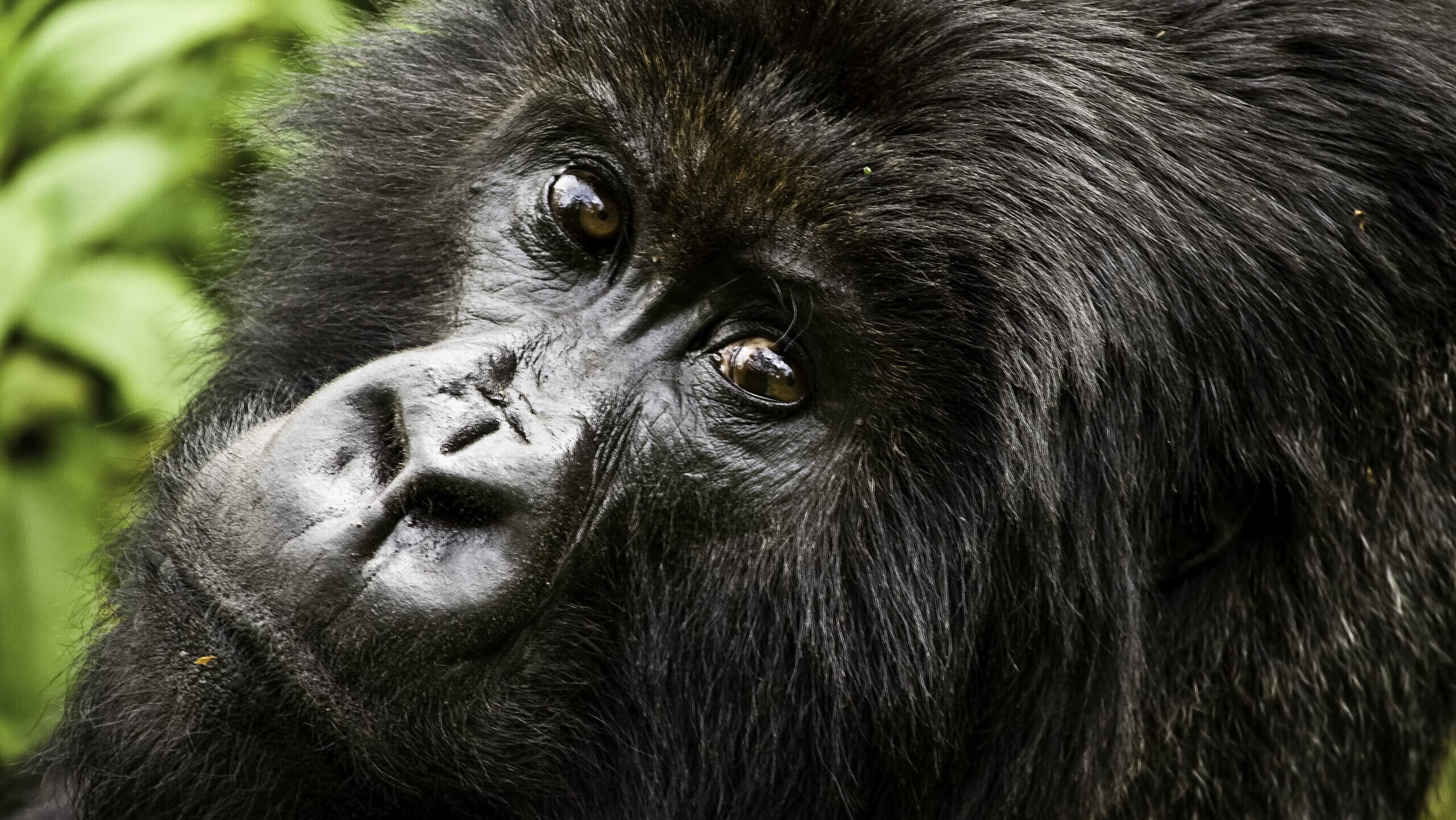Price
 $4749
$4749
Overview
Explore Uganda and Rwanda’s natural beauty and wildlife. This journey includes trekking to observe chimps and gorillas in their natural environments and wildlife drives through Queen Elizabeth National Park, where you’ll see elephants and hippos. Additionally, visit the Kigali Genocide Museum to understand the region’s recent history. Experience a blend of wildlife safaris and insightful cultural interactions in Uganda and Rwanda, all while earning professional development credit with other educators.
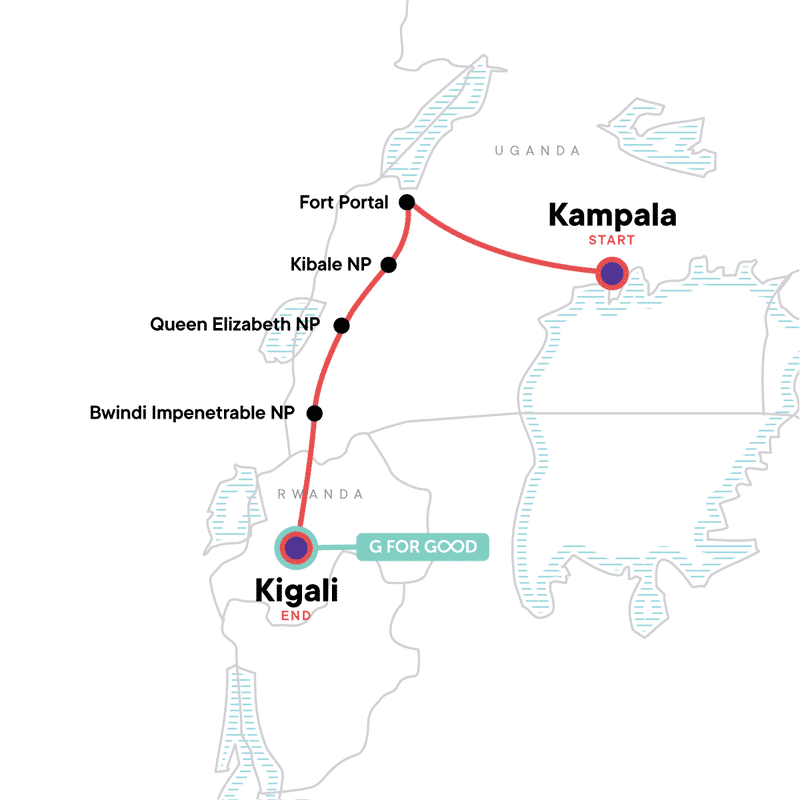
What's Included:
- Guest farm stay near Kibale National Park
- Chimpanzee trek
- Bigodi community lunch
- Queen Elizabeth National Park wildlife safari drives
- Guided gorilla trekking in Bwindi Impenetrable National Park
- Visit to Kigali Genocide Museum
- All national park fees and trekking permits
- G Adventures Tour Leader throughout, certified safari driver/guide, camp crew
- 7 breakfasts, 4 lunches, 4 dinners
- Standard hotel (1 nt), simple furnished tents/rooms (6 nts)
- All transport between destinations and to/from included activities
What's Not Included:
- International air travel
- Incidentals
- Travel health and cancellation insurance
- Applicable visas
- Tips or gratuities
- Airport taxes
- Beverages
- Meals not mentioned in itinerary
- Optional tours and admissions
- Arrival and departure airport transfers
Itinerary Download PDF
Arrive in Kampala at any time. Uganda's only international airport is Entebbe International Airport (EBB), approximately 25 miles (1 hour) outside of Kampala. Due to the potential for flight delays or cancellations, we recommend that you plan to arrive in East Africa (e.g., Nairobi, Addis Ababa, or Dar es Salaam, if not Kampala itself) at least a day or two in advance. This will also give you time to adjust to the time difference and overcome any jet lag. We can book extra hotel nights for you in Kampala before the trip if you arrive early. Hotel Check-in and Welcome Meeting Please note that check-in at the hotel is usually around 2:00-3:00 p.m. There are no planned activities until an intro meeting around 6:00 or 7:00 p.m., usually in the hotel lobby. Check for a sign or ask at the reception desk about the exact time and location of the group meeting. Please make every effort to arrive in time for this meeting. If you are delayed and will arrive late, please inform us. Your tour leader will then leave you a message at the front desk informing you of where and when to meet up tomorrow. After the meeting, you might choose to get dinner at a nearby restaurant with your traveling companions and your tour leader to further get to know one another. If you are arriving in Kampala early, you can pre-book a Nile River whitewater rafting experience in Jinja on Day 1 and be back in time for your evening welcome meeting. We strongly advise arriving in Kampala at least one full night early to facilitate the activity's early time (approximately 7:30 a.m. from Forest Cottages). Enjoy an exciting day testing your paddling skills in the rapids while waves crash into and over your eight-person raft. This activity is suitable for rafters of all experience levels. Enjoy a BBQ and drinks with your group after conquering the rapids. The excursion includes approximately 4 hours of round-trip transportation to and from Jinja from Kampala. Joining Instructions If you would like to pre-book an airport transfer in Kampala, please contact us by email. If you pay in advance for an arrival transfer, a G Adventures representative will be at the airport to meet you. If for any reason you are not met at the airport, please call the local contact number on your transfer voucher. If you are unable to make contact for whatever reason, please make your way to the hotel via taxi and notify us of the issue. If you take a taxi, look out for yellow-band cars for hire. Each taxi has an identification number and inscription “AIRPORT TAXI” in black letters. Please note this number for reference in case you experience any issues. A taxi to Kampala costs $40 or 100,000 Ugandan shillings, and the journey takes about 40–60 minutes depending on traffic. Be sure to agree on a fare before getting in, as taxi meters are not commonly used in Uganda. Accommodation: Forest Cottages (or similar) * For the actual hotel your specific departure will be using, please check your voucher.
Drive across Uganda to Fort Portal in the Western Region. Driving in Uganda can be unpredictable, but the road is generally in good condition, although some sections may have potholes or ongoing construction. The scenery becomes more picturesque as you approach Fort Portal, with views of the Rwenzori Mountains in the distance. Spend the night on a guest farm listening to the sounds of monkeys and birds. Accommodation tonight is in simple furnished tents with shared bathroom facilities. Approximate travel time: 4-6 hrs by private vehicle Accommodation: Kluges Guest Farm (or similar) Meals included: Breakfast | Lunch | Dinner
Embark on a chimp trek in Kibale National Park with a park ranger/guide. Learn about the ecosystem and keep an eye out for other animals. Although chimp sightings are not guaranteed, visitors stand a good chance of hearing and seeing our distant cousins, as they are accustomed to humans watching their daily behavior. In Bigodi, sit down for a traditional buffet-style lunch prepared with fresh, organic local ingredients. Guests dine in a grass-thatched hut and learn about Bigodi dining etiquette. Listen as your local hosts describe how the ingredients used in the dishes are grown, harvested, and prepared. During your free time, opt to venture deeper into the wetlands to spot more wildlife on a guided walk through the Bigodi Wetlands Sanctuary. On the tour, you will likely see several kinds of monkeys including black and white colobus, red colobus, mangabey, red tail, vervet, and L’Hoest. Other wetlands mammals include baboons, sitatunga (an increasingly endangered swamp antelope), bush pigs, civet cats, mongooses, bushbucks, and an occasional chimpanzee. The area also boasts an incredible bird population. Accommodation: Kluges Guest Farm (or similar) Meals included: Breakfast | Lunch | Dinner
Depart Fort Portal for Queen Elizabeth National Park, stopping at the equator along the way. Queen Elizabeth NP is characterized by open savanna, large areas of swamp around Lake George, the extensive Maramagambo Forest in the southeast, and the forested Kyambura Gorge along the border with Kyambura Game Reserve. Upon arrival in the afternoon, head out on a wildlife safari drive. Keep your eyes peeled for warthogs, elephants, buffalo, five different species of primates, hyenas, lions, and hippos—and possibly the elusive leopards. The park is home to Uganda's largest groups of wildlife. Accommodation in Queen Elizabeth NP is in simple furnished tents with shared bathroom facilities. Approximate travel time: 3 hrs by private vehicle Accommodation: Queen Elizabeth Bush Lodge (or similar) Meals included: Breakfast | Dinner
Take an early morning wildlife safari drive and enjoy lunch inside the park. Opt for an evening cruise along the Kazinga Channel. Enjoy a wildlife safari drive with possible sightings of buffaloes, waterbucks, warthogs, lions, leopards, hyenas, giant forest hogs, and elephants. Queen Elizabeth National Park Wildlife Safari DriveQueen Elizabeth National ParkMorning Enjoy a wildlife safari drive inside Queen Elizabeth National Park. The park is home to Uganda's largest wildlife populations. Keep an eye out for buffalo, elephants, hippos, hyenas, lions, warthogs, and the elusive leopards. Kazinga Channel CruiseQueen Elizabeth National Park30USD per person Take a boat cruise on the Kazinga Channel, a waterway inside Queen Elizabeth National Park that connects Lake George and Lake Edward. Look out for a variety of wildlife who are drawn to the channel shores. Spot birds, crocodiles, hippos, and reptiles. Accommodation: Queen Elizabeth Bush Lodge (or similar) Meals included: Breakfast | Lunch | Dinner
The drive from Queen Elizabeth National Park to Bwindi Impenetrable National Park is a journey through some of Uganda's most stunning and diverse landscapes, with views of forests, volcanoes, and lakes. As you approach Bwindi, the scenery becomes increasingly lush and mountainous, with dense vegetation. Spend the night on the edge of Bwindi Impenetrable National Park. Accommodation is in simple furnished tents/rooms with ensuite bathroom facilities. Approximate travel time: 5-6 hrs by private vehicle Accommodation: Rushaga Gorilla Camp (or similar) Meals included: Breakfast
Early in the morning, head into Bwindi Impenetrable National Park to meet the park ranger/guide for orientation. In the local Runyakitara language, spoken by the Bakiga and Bantu people who live in the region, the word "Bwindi" means "impenetrable," which aptly describes the dense, thick forest that characterizes the park. This impenetrability has helped preserve the park's rich biodiversity, including its famous population of mountain gorillas. Embark on the gorilla trek, which can vary in length (1–6 hours) and difficulty depending on the location of the gorilla family that is being visited. Bwindi Impenetrable National Park has four areas; Rushaga, Buhoma, Nkuringo, Ruhija. Depending on permit availability, your group could be tracking gorillas from different areas of the park. Spend 1 hour (max) observing these beautiful and endangered creatures, a truly unforgettable experience. A close encounter with these amazing animals is simply breathtaking. Make the trek back and return to town, and then enjoy free time in the afternoon. Get prepared before heading out: Bring plenty of water and waterproof clothing (it can rain with only a few minutes' notice), and be sure to bring dry sacks if you are carrying a camera and film. Dress in layers with long sleeves and long pants to protect against stinging nettles found in the forests. The trek is often chilly at first, but the walking will warm you up. You have the option to hire a local porter to carry your day pack throughout the trek. Please note: Ugandan authorities are fiercely protective of this natural treasure and currently permit only a maximum of eight people per day to visit any given gorilla family. The group will be split into multiple sub-groups for the trek if necessary. Depending on the number of participants, the different sub-groups may need to do their trek on different days. Accommodation: Rushaga Gorilla Camp (or similar) Meals included: Breakfast
Depart Bwindi this morning and cross the border to Rwanda at the Gatuna/Katuna Border Post. In Kigali, visit the Kigali Genocide Memorial Centre, which serves as a museum and permanent memorial to those who fell victim to the 1994 Rwandan genocide. The Centre opened on the tenth anniversary of the Rwandan Genocide in April 2004 and was built on a site where more than 250,000 victims are buried. Also in Kigali, enjoy lunch at the Women's Center in Nyamirambo, the largest and most vibrant township in Rwanda. The center provides women and girls from a diverse range of backgrounds with the opportunity to support each other and succeed through education and training programs. Lunch will be prepared by women employed at the center, allowing you to try local foods and popular dishes. After lunch, take some time to browse the center's shop, which features handmade, high-quality crafts and clothes made by some of the women at the shop as well as other women's cooperatives throughout Rwanda. Proceeds from the meal and shop help support the center's education and training programs, including a community library. The program ends today upon arrival at Kigali View Hotel. Please note that accommodation at the hotel is not included tonight, but we can arrange accommodation for you if you intend to spend the night in Kigali. Otherwise, when arranging your departure flight, please book flights that depart after 8:00 p.m. That departure time takes into consideration the travel time to the airport and normal check-in and security wait times. The city's airport is Kigali International Airport (KGL). If you book post-trip accommodation at Kigali View Hotel, please note that the check-out time the next day is mid-morning, but luggage storage services are available at the reception desk. Want more adventure? Book two or more GEEO programs in the same school year and receive a discount! GEEO will give you 10% off the lesser-value program(s) (up to three programs per year). If you would like to extend your time abroad but don't see another GEEO program that interests you, let us know. We can help you find a trip from our partner tour's much larger catalog. Their tours are open to the general public and not designed specifically for educators, but we can still offer you and your travel companions a discounted educator price on any of their tours, and you would still receive GEEO's fast and attentive customer service. Approximate travel time: 4.5–5.5 hrs by private vehicle (not including border crossing formalities) Meals included: Breakfast | Lunch
*Itinerary Disclaimer: While it is our intention to adhere to the routes described on our website, there is a certain amount of flexibility built into the itinerary and on occasion it may be necessary, or desirable, to make alterations. The itinerary is brief, as we never know exactly where our journey will take us. Due to our style of travel and the regions we visit, travel can be unpredictable. The information on our website is a general guide to the tour and region, and any mention of specific destinations or wildlife is by no means a guarantee that they will be visited or encountered. Additionally, any travel times listed are approximations only and subject to vary due to local circumstances.
Details
Frequently Asked Questions
Please read our general FAQs, where you can find essential information that applies to all of our programs.Resources to Learn & Teach about Uganda and Rwanda
Visit our recommended reading page to see the list of books GEEO recommends reading before your program (this is not required reading). We also have lesson plans and Pinterest boards that may be useful for you as you learn about your destination and prepare to bring lessons back to your classroom.Terms and Conditions
It is very important to review our Terms and Conditions before signing up for a GEEO program.GEEO Program Confirmation Process
We require a minimum of 6 participants for most GEEO programs. We officially confirm that a program will run once at least 8 people have signed up, which provides a margin for individual cancellations. Nearly all GEEO programs ultimately meet this enrollment quota, and in the rare event that a program does not meet the minimum requirement and GEEO cancels the program, we will work with you to find a suitable alternative or provide a refund of your deposit if you prefer. We encourage you to sign up for any program that interests you, and we will notify the entire group once 6 people are booked and again once 8 people are booked. We always emphasize the importance of exercising caution when making non-refundable travel arrangements, especially given the unpredictable nature of travel. For example, we typically recommend booking flights with flexible change/cancellation policies.Cancellation Policy
All cancellations must be submitted to GEEO in writing by emailing your request for cancellation to travel@geeo.org. If you do not receive a confirmation that we have received your cancellation request, please call us at 1-877-600-0105.- If you cancel 60 days or more prior to the start of your program, all your program fee payments will be refunded excluding your $350 deposit, which is kept on file for future use and never expires. (Exception for participants who receive grants from our university partners: To address disruption caused by cancellation from grant recipients, deposits paid by grant recipients are forfeited upon cancellation.)
- If you cancel between 30 and 59 days prior to the start of your program, you will receive a 50% refund and your deposit will be kept on file for future use and will never expire.
- If you cancel within 30 days prior to the start of your program, you will receive no refund, but your deposit will be kept on file for future use and will never expire.
Trip Notes & Expectations
Before you decide to travel with GEEO, it is important that you read all of the information about the program contained on this page. Our programs are quite adventurous, and we find that clients who read the trip details in full are happier with their experiences.- PHYSICAL REQUIREMENT: To participate in this trip, travelers should be in excellent physical condition, without any heart problems, and prepared to spend strenuous days in humid rain forests, with steep terrain and high altitude trekking for chimpanzee and gorillas. Please ensure you meet these physical requirements.
- ACCOMMODATION: Most accommodation is in simple furnished tents with shared bathrooms. As this is a developing region, standards may differ from what you’re used to, and interruptions to electricity and water are common. Hotel stays in Uganda will be in basic but comfortable twin-share rooms with mosquito netting. Tents are large, walk-in, furnished with two beds, linens, and mosquito netting. No sleeping bag or extra netting is needed. We appreciate your patience, understanding, and sense of adventure.
- TRANSPORTATION: Road travel can be difficult, with long drives and poor road conditions at times. Please take note of the travel times and distances in the itinerary above, and consider that this is often on poor quality, bumpy roads. Despite this, most travelers feel that the diversity of the African landscape, culture and wildlife are all well worth the experience.
- ILLNESS: Please note that if you are unwell with anything contagious, even a common cold, you may be denied participation in any of the treks to ensure the safety of the gorillas and chimps. This is a National Park regulation, and trekking permits will not be refunded if you are denied entrance due to illness.
- YELLOW FEVER: Please be advised that it is necessary to show a yellow fever vaccination certificate upon entering Uganda and Rwanda. All travelers must be vaccinated against yellow fever to participate in this program. We recommend contacting a travel health clinic (like Passport Health) to determine the cost of yellow fever vaccination before registering for this program.
- TRAVEL DAYS: Long drives and poor road conditions are the rule as opposed to the exception in both Rwanda and Uganda. Despite this, the diversity and scenery of the African landscape, the local culture, and abundant wildlife are all well worth the experience.
- WILDLIFE SIGHTINGS: We can never guarantee wildlife sightings, especially when it comes to primates like the mountain gorillas. However, the mountain gorilla trek is organized to ensure success. Before heading into the jungle, the local guides receive coordinates from trackers on the whereabouts of the gorillas, and the trackers stay with the gorillas until the group arrives.
- CAMERAS: As it is very dark and damp in the jungle. Please ensure your camera equipment is appropriate for such conditions and that you bring dry bags for protection from moisture/rain.
- MEALS: When an evening meal is not included, you will be advised by your hotel or group leader of a good local establishment. Vegetarian meals and other dietary requirements need to be specified prior to arrival. We recommend always carrying snacks with you. Meals can sometimes be far apart. Please note all bottled drinking water will be at your own expense.
- ELECTRICITY: Variable voltage, power spikes, and sporadic, unscheduled power cuts of varying duration can be expected in Uganda and Rwanda.
- GROUP LEADER: Please make sure you understand the role of your tour leader on this trip. All GEEO/G Adventures group trips are accompanied by one of G Adventure's group leaders, which they refer to as Chief Experience Officers (CEO). The aim of the group leader is to take the hassle out of your travels and to help you have the best trip possible. They will provide information on the places you are traveling through, offer suggestions for things to do and see, recommend great local eating venues, and introduce you to our local friends. Our itineraries often have plenty of free time to explore on your own. While not being guides in the traditional sense, you can expect them to have a broad general knowledge of the countries visited on the trip, including historical, cultural, religious, and social aspects. We also use local guides where we think more specific knowledge will add to the enjoyment of the places we are visiting – we think it’s the best of both worlds.
Single Travelers
Half of GEEO’s participants travel by themselves, so please don’t worry if you do not have a travel companion for your trip. Our program fee is for one traveler in double-occupancy accommodation, and GEEO can find you a roommate of the same gender if you do not have a travel companion. Most of our programs have a “My Own Room” option, also known as a “Single Supplement,” which is an extra fee that you can pay to have a room to yourself. You will only incur an additional charge if you specifically request a single room. To see the price for the “My Own Room” option, please find your program on our extra services page. If you want to room alone, please email travel@geeo.org to request a single room.Emergency Contacts
Should you need to contact G Adventures during a situation of dire need, it is best to first call their local G Adventures office. If for any reason you do not receive an immediate answer, please leave a detailed message and contact information, so they may return your call and assist you as soon as possible. EMERGENCY CONTACT NUMBERS: G Adventures Local Office (Nairobi, Kenya) From outside Kenya: +254 727 208 832 From within Kenya: 0727 208 832 G Adventures Local Representative (Rwanda) Robert: +250 784 744 586 If you are unable for any reason to contact our local office, please call the numbers listed below, which will connect you directly with our 24 hour Sales team, who will happily assist you. Toll-free, North America only: 1 888 800 4100 Calls from UK: 0344 272 0000 Calls from Germany: 0800 365 1000 Calls from Australia: 1 300 796 618 Calls from New Zealand: 0800 333 307 Outside North America, Australia, New Zealand, Germany and the UK: +1 416 260 0999 AIRPORT TRANSFER: If you have purchased an arrival through G Adventures or if an arrival transfer is included in the cost of your tour, please note that your arrival transfer has been arranged based on flight information provided to us. If you are advised of a flight schedule change within 48 hours of your scheduled arrival time, we will do our best to rearrange your arrival transfer however we cannot guarantee this. If your arrival transfer does not arrive within 30 minutes after you have exited the arrivals area please call the local emergency contact numbers listed below for more information.Packing List
Please read this article on GEEO’s blog for our staff’s suggestions on the best gear to pack for your upcoming travels. You must be prepared to carry your own bags and be comfortable carrying them up and down stairs, on and off transportation, and to hotels. As a rule, we try not to have to walk more than 15-20 minutes with your bags, which is why we recommend keeping the weight of your bags between 22-30 lb. Most travelers carry a backpack or rolling bag of small to medium size. No XXL bags please! A daypack is also essential for carrying everyday items. Space is limited on transportation, so there is a limit of one main piece of luggage per person plus a daypack per person. Suggested Checklist- Personal clothing for hot to warm weather – we recommend packing 6-8 days of outfits, so you only have to do laundry once or not at all
- Neutral-colored clothing (your clothes will likely get very muddy, so take old clothing for the gorilla trekking. No bright colors should be worn; greens, khaki and similar neutral clothes are recommended)
- Gardening gloves (highly recommended for gorilla trekking)
- Sun hat
- Sturdy walking shoes or hiking boots
- Trekking socks (woolen or synthetic, not cotton)
- Thermal base layer for early morning trek (woolen or synthetic, not cotton)
- Hiking pants (convertible/zip-off and quick-dry recommended)
- Snacks for trekking (protein bars, chocolate, dried fruits, candies, energy sweets)
- Walking poles (highly recommended)
- Waterproof rain jacket
- Quick-dry towel (towels will not be provided during this trip)
- Daypack
- Sport sandals or flip-flops
- Sunblock
- Sunglasses
- Watch or alarm clock (or use your phone)
- Toiletries – do not rely on hotels for shampoo, bodywash, soap, etc.
- Camera (or use your phone)
- First-aid kit, including: lip salve, aspirin, bandaids, anti-histamine, Dramamine, Imodium or similar tablets for mild cases of diarrhea, electrolyte powder, insect repellent, extra prescription drugs you may be taking
- Lightweight silk sleeping bag liner
- Travel pillow
- Money belt
- Water bottle
- Headlamp
- Phone/tablet for internet – most hotels have WiFi
- Chargers for electronics as well as converters/adapters, if needed
- AirTags or Tile trackers
- Packing cubes
- Earplugs
- Snacks – packing a few granola bars is a good idea; you can buy snacks when you get there too, so don’t go crazy here
- Ziplock bags for wet clothing
- Reading/writing material
- Hand sanitizer/baby wipes
- Passport (with photocopies)
- Any entry visas or vaccination certificates required
- Travel insurance ID card
- Flight itinerary/boarding pass(es)
- USD/EUR cash
- Credit/debit card
- G Adventures vouchers
- GEEO Classroom action plans for your group – this is sent a few days before departure
Laundry
We recommend packing enough clothes so you don't have to do laundry.Passports and Visas
All GEEO programs require that the participant have a valid passport. Please see our general FAQ for information on obtaining a passport. As with all of our trips, we try to provide the most accurate information we can, but governments sometimes change visa rules. It is your responsibility to double check the information we provide below by searching here. U.S. citizens need a visa to travel to Uganda and Rwanda and must apply for a visa online in advance of travel, or else you will be refused boarding by the airline and/or entry into Uganda. We recommend the East African Tourist Visa ($100 USD), which is valid for one trip to Uganda, Rwanda, and Kenya—travelers can travel freely directly between these three countries, entering and exiting each country multiple times. (Travelers visiting Kenya must also obtain a Kenyan Electronic Travel Authorization.) Please note your first entry point must be the country through which you applied for East Africa Tourist Visa. In other words, if you are arriving in Nairobi before traveling to Uganda, you will need to apply for the EATV through the Kenyan Embassy. To apply for the visa, you will need your yellow fever vaccination card, return flight booking confirmation, a copy of your passport, and a passport-style photo. For travelers who do not obtain the East Africa Tourist Visa, a single-entry tourist visa for Uganda is $50 USD (must be applied for online in advance), and a single-entry tourist visa for Rwanda is $50 USD. Travelers can get a visa on arrival in Rwanda at the border crossing (cash USD, exact change, bills must be in new condition). IMPORTANT NOTE You must present a World Health Organization (WHO) yellow fever vaccination certificate (also called a Yellow Card) to travel to Uganda and Rwanda. See "Vaccinations" below for more details.Money Exchange
The local currency in Uganda is the Ugandan Shilling (UGX), and the local currency in Rwanda is the Rwandan franc (FRw). As currency exchange rates fluctuate, we ask that you refer to the following website for daily exchange rates: www.xe.com. We recommend that you obtain cash from ATMs in Kampala and Kigali traveling; they will dispense the local currency. We do, however, recommend that you bring at least $200 USD in cash for emergency use or in case you have trouble with the ATMs. Your tour leader will inform you where you can exchange money throughout the tour and approximately how much cash you will need. Please note that due to past problems with forgery, USD notes that were issued prior to 2006 are not accepted in Africa. Large note (e.g, $50 or $100) can be difficult to change in some places but will provide the best exchange rate. Major credit cards are accepted in most shops in major cities and towns, but please do not rely on them as a method of payment, because they are generally not widely accepted. You should be aware that you may be charged an international transaction fee; ask your financial institution about their international fees. Visa/Plus cards are the most widely accepted by businesses in East Africa; it can be more difficult to locate ATMs and businesses that accept Mastercard/Cirrus cards. If you normally use a Mastercard, we highly recommend that you also obtain a Visa card prior to departure. If you are carrying U.S. dollars, the bills should be in good condition (i.e., not torn, wrinkled, or marked on in any way) and dated recently. Please note that in many areas, there may be occasional power-outages when there will be no electricity for hours at a time. In addition, ATMs outside of larger population centers often run out of cash or can be out of order unexpectedly. These factors could affect your ability to access money from ATMs. As such, please do not rely on credit or debit cards as your only source of money. A combination of foreign currency and debit/credit cards for cash advances is best. Always take more rather than less, as you don’t want to spoil the trip by constantly feeling short of funds.Tipping
Tipping is an expected, though not compulsory, component of this program and an expression of satisfaction with the people who assist you on your trip. Tipping is also one of the most direct ways that you can have a positive economic impact within the East African community. Although it may not be customary for you, it is of considerable significance to the people who will take care of you during your travels, as an important source of income for those in the tourism industry. Giving a tip should be a seen as a formal “thank you,” and the action should in no way be awkward. The best method of tipping someone who has served your entire group is to plan in advance, and not rush when it comes to saying goodbye. A suggestion would be for each group member to contribute anonymously by putting their tip into an envelope, which the tour can present to the recipient(s), offering their thanks and showing their appreciation. This method brings the action out into the open, allowing for friendly and appreciative interaction between the group and the recipient(s). You may use the following as a guideline:- Tour leaders and drivers: $3-4 USD per day
- Trekking guides: $10-15 USD (full day)
- Local guides: $1 USD per couple of hours
- Restaurant/café servers: 10% of the cost of the bill
Vaccinations
GEEO cannot provide any medical advice, so it is very important to consult your doctor or a travel clinic about which vaccinations or medications you will need for this trip. All travelers must show a yellow fever vaccination certificate upon entering Uganda and Rwanda. It must be an official World Health Organization (WHO) yellow fever vaccination certificate, also called a Yellow Card or the International Certificate of Vaccination or Prophylaxis (ICVP). We recommend contacting Passport Health (http://www.passporthealthusa.com/), which has travel clinics located throughout the United States, to determine the cost of yellow fever vaccination before registering for this program. You can also check the CDC's recommended vaccinations for your destination. Please take this seriously!Flights
We find the best prices for flights are often available around 90-120 days before departure, but of course this varies greatly by route and time of year. You should wait until this trip is confirmed before you book non-refundable flights. GEEO and G Adventures bear no responsibility for any flights purchased before the trip is confirmed. This program begins in Kampala and ends in Kigali. Please double-check our itinerary for the date by which you must arrive in Kampala, which usually means departing the U.S. one days prior. You may want to arrive in East Africa one or more days early in case you have flight disruptions. You can arrive at any time you choose, but try to make it in time for our 6:00 p.m. Welcome Meeting on Day 1. The program ends on Day 8 upon arrival at Kigali View Hotel. Please note that accommodation at the hotel is not included that night, but we can arrange accommodation for you if you intend to spend the night in Kigali. Otherwise, when arranging your departure flight, please book flights that depart after 8:00 p.m. That departure time takes into consideration the travel time to the airport and normal check-in and security wait times.Plugs and Converters
There are two components to provide external power to your device: adapters and transformers. The adapter is the plug, adapting the prongs on a standard U.S. two to three-pronged power cord to match the prongs required by the local outlets. The transformer changes the local voltage to that required by your device. Uganda uses Type G plugs (the same used in the United Kingdom), and their voltage is 240V. (Standard U.S. electrical outlets are 120V.) Rwanda Type C plugs (the same used in mainland Europe), and their voltage is 230V. Most new devices, including phones and laptops, are made to work with the different voltage rates, but some devices, like hair dryers, may only work on the U.S. standard of 120V. Check your device's plug or manual to see what voltage range it requires. Most transformer blocks will have an “Input” line that defines its voltage capacity; for example, “Input: 100-240V” means that it will work with voltages between 100V to 240V. If your device can’t handle the higher voltage, you’ll need to purchase a transformer/converter. You can find world transformers/converters online or at many retail stores in the travel section.Weather
July is one of the best times to visit Uganda and Rwanda in terms of weather, with minimal precipitation and warm temperatures ranging in the 60s to low-80s. It is often chilly in the early morning, particularly in the jungle, but it will warm up quickly. Bring a thermal layer (woolen or synthetic) that you can shed if you get too warm.Costs
- Tour Company Fee: See our price in the top right corner.
- Optional Activities: $50-200 USD
- International Airfare from the United States: Roughly $1,200-1,800 USD If you require assistance searching for international flights, we would be happy to help you.
- Airport Transfers: $50-75 USD
- Insurance: $79-200 USD Please note: It is mandatory for all of our travelers to have Emergency Medical insurance that covers both emergency evacuation and repatriation to the sum of $200,000 USD. We also strongly recommend purchasing cancellation insurance as an add-on.
- Tipping: Roughly $50-75.
- Meals Not Listed in the Itinerary: $150-195 USD
- Laundry, Drinks, Phone Calls, etc.: Make sure you budget for these types of expenses
- Souvenirs: Variable. At your personal discretion.
- Vaccines: Variable. Please consult with your primary care provider.
- Non-Educator Donation: $100 USD (suggested donation) This is only for non-educator guests traveling with an educator on a GEEO trip. Educators and retired educators should not make this donation.

